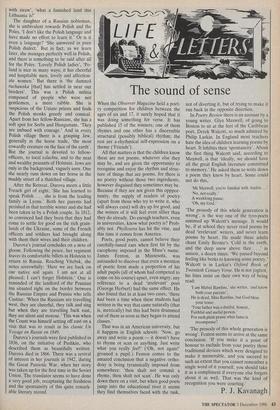Never quite one of the boys
Richard Cobb
THE CAVALRY MAIDEN by Nadezhda Durova, translated by Mary Fleming Zirin
Angel Books, £12.95, pp. 242
Ihave always had my doubts about those patriotic female officers and soldiers who only get found out when they are wounded and have to have their uniforms cut off. It is somehow too much of a set piece: they are Holding the Bridge when they are 'pierced by a thousand lances' (out of Pitt's apparently limitless armoury), or they are 'cut down by a thousand daggers' (same source, Sheffield issue). It is always a thousand, in the inflated language of the Year Two of the French Republic. How could they have got in in the first place? And surely they would have been spotted the first time they fulfilled a natural need? Still, it looks as if Durova, under the name of Aleksander, really did serve in the campaigns of 1806-7, 1809-10, 1812-14. There are full records of her service, first with a Cossack regiment, then with the Polish Horse, and finally with the Mariupol Hussars in which the Emperor Alexander gave her a commission, after awarding her the cross of St George. Of course her fellow-officers must have spotted some- thing; they all had cavalry moustaches, she did not have a moustache at all. They seemed to have shown remarkable res- traint. The Tsar asked her outright if she were a girl. The translator points out wryly that Durova was not altogether candid; she took seven years off her age, seven years off that of her beloved horse, and she failed to mention her marriage in 1801 or the birth of her son in 1803. She was no maiden.
Still, it does not really matter. Her campaign and garrison journals have an immediacy and a wide-eyed innocence about them that are both convincing and attractive. It is not the battle scenes — she fought at Borodino — that one recalls, it is the long periods of waiting, discharging garrison duties on the interminable border between Russia proper and Russian Po- land, in muddy villages and small provin- cial towns: Grodno, Dubno, Zhitomir, Mizoscz, Kolodno: Tow swampy spots overgrown with stunted shrubbery'. 'It is all just like any other spot in Poland — nothing but tumbledown shacks covered with straw', 'what a famished land this Lithuania is!'
The daughter of a Russian nobleman, she is ambivalent towards Polish and the Poles. 'I don't like the Polish language and have made no effort to learn it.' Or is it even a language? 'She answered in pure Polish dialect.' But in fact, as we learn later, she manages perfectly well in Polish, and there is something to be said after all for the Poles: 'Lovely Polish ladies', 'Po- land is nice in many ways; it has cheerful and hospitable men, lovely and affection- ate women.' But there is 'the damned ruchawska [that] has settled in near our borders'. This was a Polish militia composed of people who were not gentlemen, a mere rabble. She is suspicious of the Uniate priests and finds the Polish monks greedy and comical. Apart from her fellow-Russians, she has a soft spot for Serbs and Hungarians, 'They are imbued with courage.' And in every Polish village there is a grasping Jew, generally in the horse trade, 'the most cowardly creature on the face of the earth'. But the journal is devoted to fellow- officers, to local szlachta, and to the neat and wealthy peasants of Holstein. Jews are only in the background, vaguely seen. One she nearly runs down on her horse in the muddy street of a thatched village.
After the Retreat, Durova meets a little French girl of eight: 'She has learned to speak Polish . . she is from the leading family in Lyons.' Both her parents had perished in that terrible winter and she had been taken in by a Polish couple. In 1812, so convinced had they been that they had come to settle for good on the rich grain- lands of the Ukraine, some of the French officers and soldiers had brought along with them their wives and their children.
Durova's journal concludes on a note of gloom. Following the peace, her regiment leaves its comfortable billets in Holstein to return to Russia. Reaching Vitebsk, she notes sorrowfully: 'Here we are back on our native soil again. I am not at all pleased; I can't forget Holstein.' One is reminded of the landlord of the Prussian inn situated right on the border between the Russian Empire and Prussia who tells Custine: 'When the Russians are travelling west, they are cheerful, they talk and sing but when they are travelling back east, they are silent and morose.' This was when the Count was himself setting off east on a visit that was to result in his classic Un Voyage en Russie en 1849.
Durova's journals were first published in 1836, on the initiative of Pushkin, who described them as beautifully written. Durova died in 1866. There was a revival of interest in her journals in 1942, during the Great Patriotic War, when her story was taken up for the first time in the Soviet Union. The translator seems to have done a very good job, recapturing the freshness and the spontaneity of this quite remark- able literary record.



































































 Previous page
Previous page